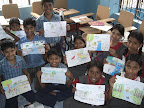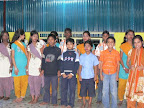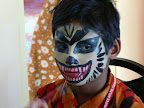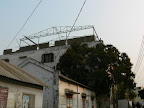 The Dhaka Project Health Care Centre team delivered their first Health Awareness workshop on Thursday January 15th 2009. The Health Care Centre promotion and education plan for 2009 includes weekly Education/Awareness workshops for students of The Dhaka Project and their family members. The initial aim is to increase health literacy among students and their families around health problems that currently present frequently at the Health Care Centre. The focus will later move to the wider community perhaps through Bangla movie screenings with health messages attached and other larger events.
The Dhaka Project Health Care Centre team delivered their first Health Awareness workshop on Thursday January 15th 2009. The Health Care Centre promotion and education plan for 2009 includes weekly Education/Awareness workshops for students of The Dhaka Project and their family members. The initial aim is to increase health literacy among students and their families around health problems that currently present frequently at the Health Care Centre. The focus will later move to the wider community perhaps through Bangla movie screenings with health messages attached and other larger events.Hand washing Day
 The school children commonly present with diarrhoea, respiratory infections, eye infections and skin problems when they attend routine appointments with Dr Jahid. For this reason the team decided that the first health awareness focus would be hand washing. Evidence from other hand washing programmes indicates that it is possible to reduce the incidence of diarrhoea by 40% the incidence of acute respiratory infections by 30% and significantly reduce presentation with eye and skin infections, if correct hand washing techniques are maintained.
The school children commonly present with diarrhoea, respiratory infections, eye infections and skin problems when they attend routine appointments with Dr Jahid. For this reason the team decided that the first health awareness focus would be hand washing. Evidence from other hand washing programmes indicates that it is possible to reduce the incidence of diarrhoea by 40% the incidence of acute respiratory infections by 30% and significantly reduce presentation with eye and skin infections, if correct hand washing techniques are maintained.During the planning phase for the workshop it was decided that it is very important for family members to be involved in the training as the hand washing behaviour of an individual family member has an impact on the health of all. An as an added benefit neighbours and friends of family members may benefit and eventually family members who have a strong interest in looking after community health may be invited to train as Community Health Workers/Paramedics.
 Ten students and their parents were invited to attend and participate in the first Hand Washing Day for 2009. Family members were invited personally during family visits in the week prior to the event and baseline data was collected. All mothers and fathers enthusiastically agreed to come along and seemed very happy to be invited. The students of The Dhaka Project are all very interested in learning anything new and attending extra programs, so it was not difficult to select the initial ten students. In fact many students were disappointed that they were not chosen for the first session.
Ten students and their parents were invited to attend and participate in the first Hand Washing Day for 2009. Family members were invited personally during family visits in the week prior to the event and baseline data was collected. All mothers and fathers enthusiastically agreed to come along and seemed very happy to be invited. The students of The Dhaka Project are all very interested in learning anything new and attending extra programs, so it was not difficult to select the initial ten students. In fact many students were disappointed that they were not chosen for the first session.As the children and family members arrived they were seated in family groups, each with an empty bowl, a cup of water, soap and a towel in preparation for the hand washing demonstration and then practice. An overview of the importance of correct hand washing with soap was given focusing on how this practice can prevent disease and when it is crucial to wash your hands (after toilet, before eating or preparing food, after cleaning a baby/child). A discussion then took place to find out whether the students and family members were aware of the kinds of illnesses are specifically related to poor hand washing technique or lack of hand washing with soap. There seemed to be strong awareness of the connection between diarhhoea and poor hand washing technique but less of an awareness that respiratory infections, skin conditions and eye infections could also be related to lack of hand washing.
After the discussion Dr Jahid explained the path of disease transmission in detail and the barriers to disease transmission using two posters that specifically developed, drawn and painted by the Health Care team to facilitate getting the message across. The posters will be used for future training and may become part of a training resource book for future Community Health Workers at The Dhaka Project.
 Correct hand washing was then demonstrated using the technique recommended by the World Health Organisation. All family groups were then supervised to individually complete correct hand washing. Everyone showed that they had watched closely by enthusiastically rubbing and scrubbing their hands and leaving a lot of very dirty water in the basins.
Correct hand washing was then demonstrated using the technique recommended by the World Health Organisation. All family groups were then supervised to individually complete correct hand washing. Everyone showed that they had watched closely by enthusiastically rubbing and scrubbing their hands and leaving a lot of very dirty water in the basins.The session continued with a Mena DVD to reinforce the hand washing and hygiene message, which adults and children alike really loved. Information was collected from each family using a survey developed by the Heath Care Centre team, focusing on health knowledge, attitude and practice.
 The workshop finished with all families being presented with soap, hand washing instructions in Bangla from WHO (World Health Organization) and a laminated certificate of attendance. The workshops will now continue weekly until all students and family members have attended.
The workshop finished with all families being presented with soap, hand washing instructions in Bangla from WHO (World Health Organization) and a laminated certificate of attendance. The workshops will now continue weekly until all students and family members have attended.





No comments:
Post a Comment